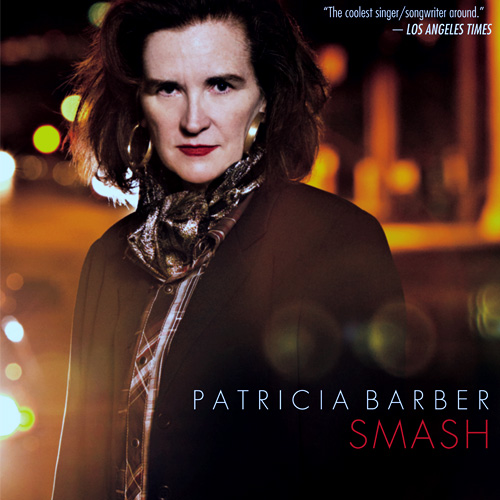Patricia Barber SMASH!
Patricia Barber SMASH. Concorde Jazz/Universal
If there were a 7 Wonders of the Musical World, Patricia Barber would have to be included. What surprises me most is that this quite extraordinary, inventive and accessible jazz singer/pianist/writer/bandleader is not at least as well known as other more hyped female artists. Barber is the supreme jazz musician whose music knows no generic boundaries and it’s for this reason that I believe SMASH to be her finest creation yet - and that is quite something when one considers the masterful quality of previous albums.
Barber has always declared the American standard as a major inspiration in her musical development, and her many interpretations are some of the finest ever recorded. SMASH starts with a Barber written ballad displaying standard-esque qualities. ‘Code Cool’ opens with a heart-stopping drumming passage from John Deitmeyer before Barber enters first with ringing paino notes and then that distinctive, fluid voice that immediately travels the vocal scale from her traditionally lower register. melody has always been important to the lady and this song is no exception but the song holds a few surprises including a middle-eight journey into musical outer space. Stunning!
‘The Wind Song’ is another ballad that travels at fairly slow pace with voice and piano notes dominating a song that illustrates the lady’s wonderful lyrical skills: “Something suddenly cool/suddenly something dearer/somone wonderful who’ll/appear suddenly nearer/someone suddenly cries/soft low and discreet/language you realize/like perfume is on a breeze” Barber’s phrasing is perfect while instrumental interludes, including Larry Kohut with some delicious bass, add to the song’s thoughtful, emotional ambience.
The relatively brief ‘Romanesque’ is dominated by the most fragile piano notes matched to a voice which bairly rises above whisper level. Title track ‘Smash’ will go down as one of my favourite songs of the year and begins the reveal of Barber’s capabilities and sensabilities. It opens in ballad form rising and falling like a flowing mountain stream; a glacially slow ballad; but then opens up in the most amazing rock style instrumnetal with guitar riffs from John Kregor which are akin to the best that Pink Floyd could produce. No wonder it’s called ‘Smash’!!! Then comes a heavy dose of Latin boso nova with ‘Redshift’ with more but very different guitar-playing from Kregor (a major star in this particular show).
‘Devil’s Food’ reveals the erotic side to Barber’s music with lyrics like: “silk on silk/sweet on sweet/meat on meat/boy you’re smooth/and you’re just my type/does that seem right to you? And Barber’s vocal is utterly convincing… Kregor again comes up trumps with the most amazing jazz guitar sounds (this guy can play anything!) while the drums play tearaway games in the background. But then Barber pipes up with some of the most exciting piano work on the album…
‘Scream’ is another favourite on this amazing album. It’s crawls at snail’s pace with twinkling piano notes and the most expressive voice that contemplates the wrongs of the world. As beforer there is a wonderful instrumental passage that steadily builds to a stunning crescendo and the return of Barber’s unimpeachable voice. The final vocal part is mind-blowing as Barber sings the word ’scream’ unaccompanied and long.
Production on this album is of characteritsic audiophile quality thanks to the valiant efforts of Jim Anderson who both recorded and mixed the album. The band’s instrumental performances are superb and beautifully captured by Anderson’s astute and sympathetic recording (check out another stupendous, classic drum performance on instrumental ‘Bashful’). This is a modern jazz masterpiece and already a potential album of the year. If there is one jazz album you buy in 2013 make it this one. ESSENTIAL.
5/5
‘SMASH’ ALBUM BACKGROUND
PIANIST/VOCALIST/COMPOSER PATRICIA BARBER SET TO RELEASE HER CONCORD DEBUT, SMASH, MARCH, 2013
On Smash, her debut on Concord Jazz, Patricia Barber reiterates her unique position in modern music as a jazz triple-threat – imaginative pianist, startling vocalist, and innovative composer (international release dates may vary). With a new band and a dozen new compositions, she also continues her two-decade crusade to retrieve the ground that jazz musicians long ago ceded to pop and rock: the realm of the intelligent and committed singer-songwriter, tackling even familiar subjects (like love and loss) with a nuance and depth beyond the limits of the Great American Songbook.
Once again – in the crisp chill of her vocals, as well as the fiery feminine intellect that informs her music and lyrics – Barber makes most of her contemporaries sound like little girls.
A prime example is the title track, where Barber paints the end of a love affair with subtly stated allusions to destruction: the erosion of edifices; a bloody road accident. The lines are more akin to poetry than conventional song lyrics, as she depicts “the crumbling of tall castles built / on kisses and blood / and dreams so like sand.” The song’s reprise compares “the sound of a heart breaking” to “the sound of / the red on the road” – a devastatingly effective mélange of synesthetic imagery. Aided by a raw, forceful guitar solo, the performance illuminates a counter-intuitive realization about loss:
“It just struck me, as it does everyone who experiences great loss, that on the outside, no one can tell,” Barber explains. “You go to the grocery store, and everything’s the same, which is shocking. It struck me that this is the sound of a heart breaking: silence. You’re alone. And I felt that this was an interesting juxtaposition, since the sound of a heart breaking should be the loudest, screamiest, shriekiest combination of sounds there could be.”
Photo By Jimmy Katz
Barber has another song on the subject of “loud, shrieky” emotion: “Scream,” paradoxically set to a gentle, quiet melody that belies its message, and which has proved extremely popular with those audiences hearing it prior to this recording. “Scream / when Sunday / finally comes / and God / isn’t there . . . . the soldier / has his gun / and the war / isn’t where / we thought it would be.” As Barber points out in conversation, with only the slightest sarcasm, “It’s an angry song – and everyone wants that.”
Her anger finds a more whimsical (but no less impactful) outlet in the catchy “Devil’s Food,” written specifically from Barber’s perspective as a gay woman: “boy meets boy / girl meets girl / given any chance / to fall in love / they do . . . / like loves like / like devil’s food / like chocolate twice / I’m in the mood / for you . . . .” She wrote the song in reaction to last year’s highly publicized efforts to quash gay-marriage initiatives around the country:
“It made me mad, and it made me want to make a declaration – but to make it fun. I find one of the best ways to bring people to your perspective is of course to charm them, and music can always do that. That’s how I get a lot of people thinking about a lot of things. I mean, the lyrics are fairly graphic – ‘sweet on sweet, meat on meat’ – but the music is so beguiling, I think I make the case. And when it becomes clear that it’s turning into a gay disco song, it’s really fun watching people’s reaction, which is surprise and mostly delight.”
It’s not the usual territory trod by jazz singers and songwriters; we’re a long way from “The Man I Love.” (“Smart songs about the way we think and live, not just about the way we love,” wrote Margo Jefferson in The New York Times.)
Much of Barber’s magic lies in setting these words to music as fully evocative as it is coolly provocative. Many of her arrangements attain a thrilling friction between style and substance. (For a defining example, turn to “Redshift,” in which Barber weds the science-geek lyric – itself a miraculous marriage of physics and love – to the gentle lull of a bossa-nova beat.) Throughout the album, her Chicago-based quartet – comprising the superlative rhythm team of bassist Larry Kohut and drummer Jon Deitemyer, with the edgy and arresting John Kregor on guitars – functions as a translucent extension of Barber’s own musicality, while her piano work enjoys a prominence that some of her newer fans may not previously have experienced.
|
|

|

Taking Back Sunday |
LATEST GALLERY IMAGES

The Evil of Netanyahu 
Snow Patrol 2025 |
|
|



